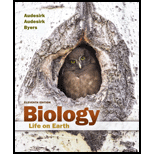
Biology: Life on Earth (11th Edition)
11th Edition
ISBN: 9780134168296
Author: Gerald Audesirk, Teresa Audesirk, Bruce E. Byers
Publisher: PEARSON
expand_more
expand_more
format_list_bulleted
Concept explainers
Question
Chapter 1, Problem 5AC
Summary Introduction
To review:
A scientific method to help start the car, if the jump start did not work and the hypothesis tested next.
Introduction:
A scientific method involves a series of steps, which help in the analysis of a question framed either on the basis of observation or experimentation. This method helps to evaluate a theory on the basis of real observation. Experiments involved for the practical knowledge helps in the determination of the reliable aspect of any theory proposed merely on the basis of observation.
Expert Solution & Answer
Want to see the full answer?
Check out a sample textbook solution
Students have asked these similar questions
What are Clathrin coated vesicles and what is their function?
How is a protein destined for the Endoplasmic Reticulum (ER), imported into the ER? Be concise.
Find out about the organisations and the movements aimed at the
conservation of our natural resources. Eg Chipko movement and Greenpeace.
Make a project report on such an organisation.
Chapter 1 Solutions
Biology: Life on Earth (11th Edition)
Ch. 1 - Evolution is a. a belief. b. a scientific theory....Ch. 1 - Prob. 2MCCh. 1 - Which of the following does not apply to...Ch. 1 - Viruses a. have DNA confined in a nucleus. b. are...Ch. 1 - Which of the following is true? a. All cells are...Ch. 1 - 1. Organisms respond to _______. Organisms acquire...Ch. 1 - Prob. 2FTBCh. 1 - Prob. 3FTBCh. 1 - An important scientific theory that explains why...Ch. 1 - 5. The molecule that guides the construction and...
Ch. 1 - What properties are shared by all forms of life?Ch. 1 - Why do organisms require energy? Where does the...Ch. 1 - Define evolution, and explain the three natural...Ch. 1 - Prob. 4RQCh. 1 - 5. What are some differences between prokaryotic...Ch. 1 - 6. What basic principles underlie scientific...Ch. 1 - What is the difference between a scientific theory...Ch. 1 - 8. What factors did Rudi control for in his open...Ch. 1 - 9. Explain the differences between inductive and...Ch. 1 - List the steps in the scientific method with a...Ch. 1 - 1. What misunderstanding causes some people to...Ch. 1 - 2. How would this textbook's definition of life...Ch. 1 - 3. Review Alexander Fleming's experiment that led...Ch. 1 - 4. Explain an instance in which your own...Ch. 1 - Prob. 5AC
Knowledge Booster
Learn more about
Need a deep-dive on the concept behind this application? Look no further. Learn more about this topic, biology and related others by exploring similar questions and additional content below.Similar questions
- What are biofertilizers and mention the significancearrow_forwardPCBs and River Otters: Otters in Washington State’s Green-Duwamish River have high levels of polychlorinated biphenyls (PCBs) in their livers. PCBs can bind to the estrogen receptors in animals and disrupt the endocrine system of these otters. The PCBs seem to increase the estrogen to androgen ratio, skewing the ratio toward too much estrogen. How would increased estrogen affect the river otter population? Based on your reading of the materials in this unit, what factors can affect fertility in humans? Explain how each of the factors affecting human fertility that you described can disrupt the human endocrine system to affect reproduction.arrow_forwardOther than oil and alcohol, are there other liquids you could compare to water (that are liquid at room temperature)? How is water unique compared to these other liquids? What follow-up experiment would you like to do, and how would you relate it to your life?arrow_forward
- Selection of Traits What adaptations do scavengers have for locating and feeding on prey? What adaptations do predators have for capturing and consuming prey?arrow_forwardCompetition Between Species What natural processes limit populations from growing too large? What are some resources organisms can compete over in their natural habitat?arrow_forwardSpecies Interactions Explain how predators, prey and scavengers interact. Explain whether predators and scavengers are necessary or beneficial for an ecosystem.arrow_forward
- magine that you are conducting research on fruit type and seed dispersal. You submitted a paper to a peer-reviewed journal that addresses the factors that impact fruit type and seed dispersal mechanisms in plants of Central America. The editor of the journal communicates that your paper may be published if you make ‘minor revisions’ to the document. Describe two characteristics that you would expect in seeds that are dispersed by the wind. Contrast this with what you would expect for seeds that are gathered, buried or eaten by animals, and explain why they are different. (Editor’s note: Providing this information in your discussion will help readers to consider the significance of the research).arrow_forwardWhat is the difference between Uniporters, Symporters and Antiporters? Which of these are examples of active transport?arrow_forwardWhat are coupled transporters?arrow_forward
arrow_back_ios
SEE MORE QUESTIONS
arrow_forward_ios
Recommended textbooks for you
 Human Heredity: Principles and Issues (MindTap Co...BiologyISBN:9781305251052Author:Michael CummingsPublisher:Cengage Learning
Human Heredity: Principles and Issues (MindTap Co...BiologyISBN:9781305251052Author:Michael CummingsPublisher:Cengage Learning Concepts of BiologyBiologyISBN:9781938168116Author:Samantha Fowler, Rebecca Roush, James WisePublisher:OpenStax College
Concepts of BiologyBiologyISBN:9781938168116Author:Samantha Fowler, Rebecca Roush, James WisePublisher:OpenStax College Biology 2eBiologyISBN:9781947172517Author:Matthew Douglas, Jung Choi, Mary Ann ClarkPublisher:OpenStax
Biology 2eBiologyISBN:9781947172517Author:Matthew Douglas, Jung Choi, Mary Ann ClarkPublisher:OpenStax Human Biology (MindTap Course List)BiologyISBN:9781305112100Author:Cecie Starr, Beverly McMillanPublisher:Cengage Learning
Human Biology (MindTap Course List)BiologyISBN:9781305112100Author:Cecie Starr, Beverly McMillanPublisher:Cengage Learning Biology Today and Tomorrow without Physiology (Mi...BiologyISBN:9781305117396Author:Cecie Starr, Christine Evers, Lisa StarrPublisher:Cengage Learning
Biology Today and Tomorrow without Physiology (Mi...BiologyISBN:9781305117396Author:Cecie Starr, Christine Evers, Lisa StarrPublisher:Cengage Learning

Human Heredity: Principles and Issues (MindTap Co...
Biology
ISBN:9781305251052
Author:Michael Cummings
Publisher:Cengage Learning

Concepts of Biology
Biology
ISBN:9781938168116
Author:Samantha Fowler, Rebecca Roush, James Wise
Publisher:OpenStax College

Biology 2e
Biology
ISBN:9781947172517
Author:Matthew Douglas, Jung Choi, Mary Ann Clark
Publisher:OpenStax

Human Biology (MindTap Course List)
Biology
ISBN:9781305112100
Author:Cecie Starr, Beverly McMillan
Publisher:Cengage Learning

Biology Today and Tomorrow without Physiology (Mi...
Biology
ISBN:9781305117396
Author:Cecie Starr, Christine Evers, Lisa Starr
Publisher:Cengage Learning
